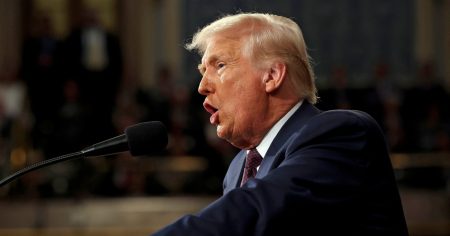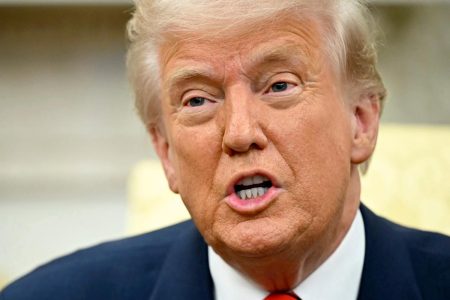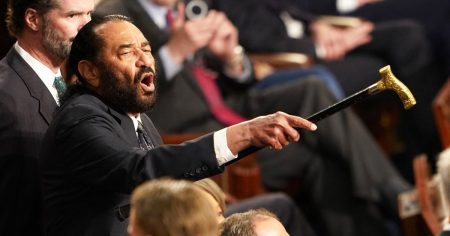Concerns Grow Over Politicization of the Justice Department
A Departure from Tradition: The Justice Department Under Fire
In the month since the Trump administration took over the Justice Department, a series of controversial actions has raised serious concerns about the department’s independence and whether it is being used as a political tool. Despite Attorney General Pam Bondi’s assurances during her Senate confirmation hearing that the Justice Department would not “play politics,” the actions taken by top officials have sparked widespread criticism and unrest within the department. These actions include demanding the names of FBI agents who investigated the Capitol riot, suing a state attorney general who had won a major fraud verdict against Donald Trump, and ordering the dismissal of a criminal case against New York Mayor Eric Adams. These moves have led to resignations, firings, and a growing sense of unease about the department’s ability to remain impartial.
Dismissal of the Adams Case Sparks Outrage
One of the most contentious decisions involved the dismissal of a criminal case against New York Mayor Eric Adams. The Justice Department ordered the dismissal, citing concerns that the charges would hinder Adams’ ability to collaborate with the Republican administration on immigration issues. Danielle Sassoon, the Manhattan federal prosecutor overseeing the case, resigned in protest, accusing the department of engaging in a “quid pro quo” by dropping the case to secure Adams’ cooperation on immigration policies. Sassoon’s resignation was followed by several other high-ranking officials, including Hagan Scotten, a prosecutor involved in the Adams case, who called the demand to drop the charges “foolish” and “cowardly.”
The dismissal of the Adams case has drawn comparisons to the 1973 “Saturday Night Massacre,” when Justice Department leaders resigned rather than carry out President Richard Nixon’s orders to fire the Watergate special prosecutor. While the circumstances are different, the wave of resignations has raised concerns about the department’s independence and the potential for political interference in criminal cases.
The Weaponization of the Justice Department
The Justice Department’s actions have also been criticized for appearing to target individuals and cases that align with the administration’s political agenda. Bondi announced the creation of a “Weaponization Working Group” on her first day in office, tasked with scrutinizing prosecutors who brought criminal and civil cases against Trump. This move has been seen as an attempt to undermine the legitimacy of these cases and to restore what the administration views as the department’s “integrity and credibility.”
The working group has singled out high-profile prosecutors, including special counsel Jack Smith, who brought two criminal cases against Trump, and New York Attorney General Letitia James, who won a $500 million fraud judgment against Trump. These actions have led to accusations that the Justice Department is being weaponized to protect the administration’s allies and retaliate against its opponents.
Lawsuits and Political Battles
The Justice Department has also taken aggressive action in other areas, including filing a lawsuit against New York over a law that allows undocumented immigrants to obtain driver’s licenses. Bondi announced the lawsuit at a news conference, incorrectly stating that she had filed charges against New York Attorney General Letitia James and Democratic Gov. Kathy Hochul. While she later clarified that the lawsuit was against the state, the incident highlighted the department’s increasingly combative approach to issues that align with the administration’s political priorities.
These actions have drawn sharp criticism from legal experts and former Justice Department officials, who warn that the department is losing its independence and becoming a tool for political retribution. The lawsuits and dismissals have also raised concerns about the fairness of the criminal justice system and whether individuals with political connections are being treated differently than others.
The Future of the Justice Department
As the Justice Department continues to face criticism and internal turmoil, the question remains whether it can maintain its independence and uphold its mission to enforce the law impartially. The wave of resignations and the administration’s increasingly aggressive actions have raised concerns about the long-term consequences for the department and the rule of law.
Retired federal prosecutor David Laufman has warned that the department is at risk of being “hollowed out” and that the current actions could undermine its integrity for years to come. The Justice Department’s ability to navigate these challenges and restore public trust will depend on its willingness to resist political pressure and remain committed to its core function of upholding the law.
In conclusion, the actions taken by the Justice Department under the Trump administration have raised serious concerns about politicization and the erosion of its independence. The dismissals, lawsuits, and targeting of political opponents have drawn comparisons to past scandals and highlighted the need for the department to stay true to its mission of impartial justice. As the administration continues to exert influence over the department, the stakes for the rule of law and the integrity of the Justice Department couldn









